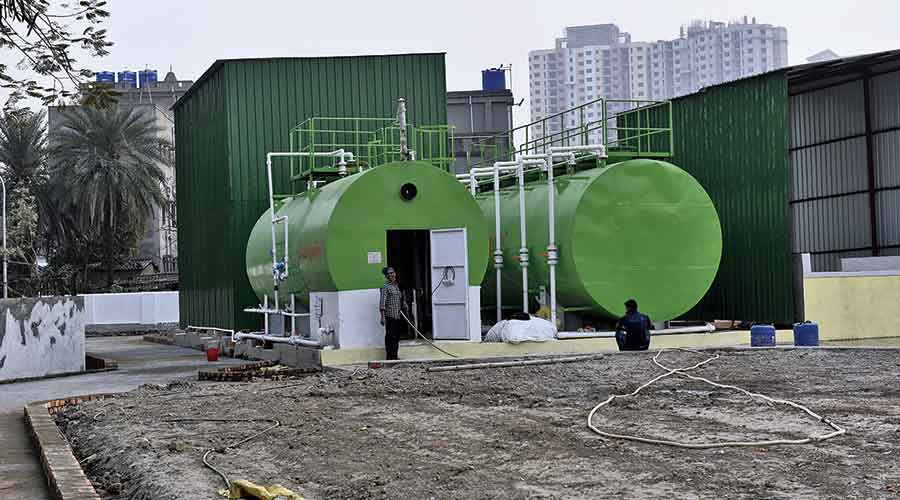A biogas plant will convert waste collected from houses, restaurants and office complexes in New Town into power that will light up some of its streets.
Electricity generated from the plant near Balaka Abasan in Action Area I of New Town will power street lights on a 2-km stretch on either side of the housing complex.
“The street lights are now lit with the power drawn from the regular electrical grid in New Town. Once the biogas plant starts generating electricity, the regular power lines will be kept as back-up,” an official of the New Town Kolkata Development Authority (NKDA) said.
“The plant is likely to be operational towards the end of March. Work to connect the street lights to the plant's electrical outlet has started.”
The plant will process wet waste or biodegradable items and has a composting tank. This tank is filled with vegetable peels and fruit pulp collected from offices, houses and restaurants.
It will take around a month’s time for the biodegradable waste to break down and produce biogas.
“This unit will help us greatly reduce the amount of biodegradable waste that finds its way to landfill sites,” said the official.
A biogas plant — described as an anaerobic digester — comprises an airtight tank filled with microorganisms and bacteria that can transform biomass into biogas.
NKDA chairman Debashis Sen said the plant could process five metric tonnes of wet waste.
“As a pilot study, we will use the electricity generated by the plant to power street lights in the vicinity,” Sen said.
Vegetable peels, fruit pulp and even maize stalk can be put into the tank to produce biogas.
The compost that will be produced, in another unit inside the complex, will be mixed with soil in median dividers where trees have been planted. “After the production increases, we will use the compost at Eco Park and the ‘tall tree nursery’ and other places that have greenery,” another NKDA official said.
The composting unit, which officials said will be sealed and odour-less, will be able to produce at least 100kg of compost after every refill.
Waste management professionals said the trend across the world was to recycle waste to reduce its volume and produce new products from it.
The Calcutta Municipal Corporation has started a composting unit in Ward 82 (Chetla), where market waste is treated to generate manure. But there is no biogas generation unit yet in the CMC area.
According to Sen, collecting raw materials for the biogas plant and the composting unit would not be a problem since most houses, offices and restaurants in New Town were segregating their waste and handing out biodegradable waste in separate containers to door-to-door collectors.
“We started segregation of waste at source and almost all the houses and establishments in New Town have been given colour-coded bins (for separate disposal of biodegradable and non-biodegradable waste). Almost all of them are doing this. Biodegradable waste items such as vegetable peels and fruit pulp will be used to make compost and biogas,” said Sen.
The NKDA has also started upcycling e-waste collected from the township and Sector V and making them fit for reuse in an attempt to prevent accumulation of hazardous materials at dumping sites.
Metro had reported earlier how old smartphones, personal computers and other electronic gadgets were being collected from homes and offices. These are then repaired and restored so they can be used once more.
“The ones that cannot be repaired will be used to make various household items, including decorative pieces,” an NKDA official said.
The repaired and refurbished items are put on display at the Zero Waste shop near the New Town bus stand intersection to encourage people not to throw away their electronic gadgets with other household waste.











